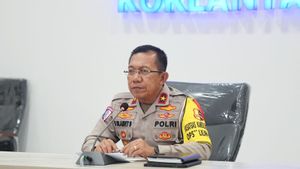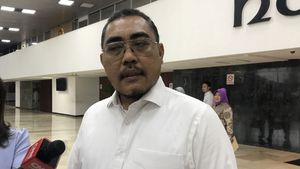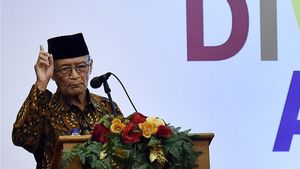JAKARTA - The global COVID-19 pandemic has not reduced the number of drug trafficking in Indonesia. In the period from 2019 to 2021, the prevalence rate of the Indonesian population who have used drugs has increased by 0.15% or around 3.66 million people.
This was stated by the Director of Information and Communication, Politics, Law, and Security of the Ministry of Communication and Information (Kemenkominfo), Drs. Bambang Gunawan, M.Si at the Digital Human Rights and Legal Literacy Forum (FIRTUAL) with the theme "Fighting Drugs Towards a Shining Indonesia"
As one of the efforts to overcome this, in the prevention aspect, BNN cooperates with the Ministry of Communication and Information in terms of providing and disseminating information about preventing the dangers of narcotics and narcotics precursors to state officials, State Civil Apparatus (ASN), Indonesian National Armed Forces (TNI) soldiers. ), members of the Indonesian National Police (Polri), and the public, as stated in the National Action Plan for the Prevention and Eradication of Abuse and Illicit Trafficking of Narcotics and Narcotics Precursors for 2020-2024, said Bambang further.
The Ministry of Communication and Information plays a role in providing socialization related to anti-drugs to increase awareness of state officials, State Civil Apparatus (ASN), Indonesian National Armed Forces (TNI) soldiers, members of the Indonesian National Police (Polri), and the general public about the dangers of drugs and encourage their active participation.
The forum, which is in collaboration with the National Police's Son and Daughter Family (KBPP), presented the Head of the BNN Non-Electronic Media Sub-Directorate, Kombes Pol. Deni Dharmapala, SH., SIK, MH; Secretary General of the Indonesian National Police's Son and Daughter Family (Secretary General of the KBPPP), Brigadier General. Pol. (Ret.) ADV Drs. Siswandi; Chairperson of the Harapan Permata Hati Kita Foundation (Yakita) Addiction Treatment & Recovery Center, Sri Hayuni; and 2008 Anti-Drugs Public Figure and Ambassador, Olivia Zalianty.
BNN's Efforts and Strategies in the Context of War on Drugs Towards a Shining Indonesia
Police Commissioner. Deni Dharmapala reiterated that in the 2019 to 2021 pandemic period there was a phenomenon of an increase in drug abuse in various categories of society. In an effort to reach young people and teenagers, since 2019 BNN has initiated the Anti-Drug Education House program which is realized through the digital platform rean.id. Through this platform, BNN seeks to attract youth and various communities to channel creative expressions that voice anti-drugs among teenagers.
"Rean.id's grand strategy will place communities in an important and strategic position in carrying out various development efforts in the digital sphere," Deni explained.
Deni explained that there are four strategies carried out by BNN in the framework of the 'War On Drugs Towards a Shining Indonesia', namely the soft power approach which is realized through prevention, community empowerment, and rehabilitation; hard power approach which is realized through eradication action; smart power approach through the use of information technology; and cooperation both in the community, national, regional and international scope.
Deni also invited all webinar participants to launch the War on Drugs campaign - the War against Narcotics Creates a Shining Indonesia (Narcotics Clean) in three ways, namely daring to refuse, daring to rehab, and daring to report.
Community Participation in Drug Eradication Efforts
Society has a big role in the prevention and eradication of drugs. This was conveyed by the Secretary General of the National Police's Son and Daughter Family (Secretary General of KBPPP), Brigadier General. Pol. (Ret.) ADV Drs. Siswandi in the next session.
"Any program that is run without the active role of the community, the program will not succeed," he said.
Siswandi said, currently there are many ways that the public can use to report narcotics abuse to the authorities and urges the public not to be afraid to exercise their rights.
"Law No. 35 of 2009 protects the rights of the community in efforts to prevent and eradicate drug abuse and illicit trafficking,” explained Siswandi.
He added that cross-sectoral handling is needed to deal with the threat of drugs, so that government agencies, both at the central and regional levels, must integrate budgets with an anti-drug perspective.
The Role of the Family as the First Stronghold
Continuing this, the Chairperson of the Harapan Permata Hati Kita Foundation (Yakita) Addiction Treatment & Recovery Center, Sri Hayuni, conveyed that the war on narcotics is not a war using weapons, but a war that uses an understanding of the bad effects of drug abuse, known as addiction. He invited especially the smallest scope in society, namely the family to play an active role in providing understanding to children.
"Explain to our children about the risks and dangers of drugs before the drug dealers talk to our children," said Sri.
There are three intervention strategies that families can do in an effort to prevent drug abuse, namely supply reduction by ensuring there is no drug supply at home; demand reduction by ensuring that children are not interested in drugs; and harm reduction by providing understanding to children about the bad risks and dangers of using drugs.
“Children will quickly become victims of the environment if the family does not guide the child and discuss difficult and sensitive matters. There are times when parents also become friends for their children and do not interact only when there is a problem,” said Sri.
'Cool Without Drugs'
Also present were the 2008 Anti-Drugs Public Figure and Ambassador, Olivia Zalianty, who underlined the various bad effects of drugs on a generation.
"For me, drugs are the number one crime, because it is the people, the generations that are being damaged," he said.
On the other hand, he admits that currently drugs cannot be eradicated, but with collaboration between the government and the community, drug abuse can be suppressed to its lowest point. According to him, one of the causes of someone becoming a drug addict is the release of endorphins when using drugs which causes a person to be happy or feel happy.
Olivia emphasized that there are positive activities that can also release endorphins, namely by exercising regularly. He also emphasized that the active role of parents is needed in early prevention of drug use by fostering confidence in their children.
"High self-confidence can encourage children to be able to excel so they are not easily influenced to use drugs," concluded Olivia.
This webinar is held by the Ministry of Communication and Information online via Zoom and offline at Swiss-Belhotel Serpong. Apart from webinars. The activity was also filled with social media challenges that the participants could participate in.
The English, Chinese, Japanese, Arabic, and French versions are automatically generated by the AI. So there may still be inaccuracies in translating, please always see Indonesian as our main language. (system supported by DigitalSiber.id)








